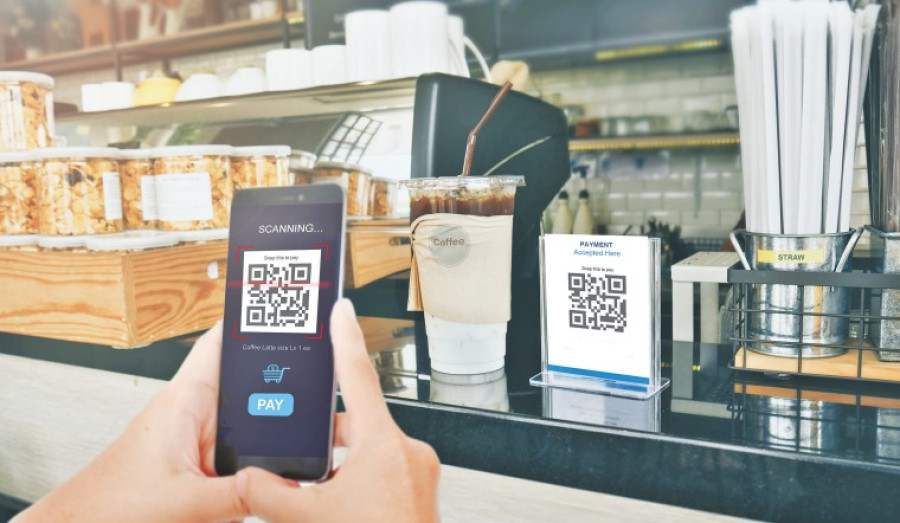Money
India launched Quick Response code two weeks ago. Nepal still discussing details
Starting March 1, Indians have been allowed to make payments for purchases through their mobile phone, but Nepal is still working on the daily transaction limit. The digital payment arrangement with China is also unidirectional.
Krishana Prasain
As Nepal’s central bank struggles to decide to set the transaction limits for digital wallets, officials say it may take months for Nepalis visiting India to avail of the services there.
India has already launched a service where Indian citizens can make payments through the (quick response) QR code from their mobile phones in Nepal.
From March 1, Indians are allowed to make payment for purchases through their mobile phones, marking a milestone in cross-border digital payment between Nepal and India.
For the service in Nepal, two digital wallets, Khalti and Fonepay Payment Service, have partnered with India’s NPCI International Payments (payment service operator of India) to launch the cross-border payment service using quick-response (QR) codes.
Immediately after India’s launch, the central bank constituted a task force to set the transaction limits for digital wallet users in India.
“Our study regarding the daily transaction limit, including other issues and risks for cross-border payment is in the final stage,” said a top official at Nepal Rastra Bank, who wished not to be named.
“We hope that the payment service in India will begin in May if things go as planned.”
The foreign exchange department of the central bank is still discussing issues related to transaction limits, said the official.
The study will also include ways to mitigate the risk of cross-border transactions, said the official.
Currently, Nepalis can make payments using their debit cards. When it comes to mobile payment, it is simply a matter of adding the payment method, but what is important is the possible risks associated with cross-border transactions, said the official.
On June 1 last year, Nepal and India signed a memorandum of understanding for cross-border digital payment to ease digital transactions for business people, students, and tourists from both countries.
With the strategic partnership between two digital wallets, Khalti and Fonepay Payment Service with India’s NPCI International Payments, Indian tourists now can make seamless transactions in the Nepali market by scanning Khalti QR code using their preferred digital wallets, such as PhonePe and BHIM UPI.
The digital payment system is expected to boost the country’s trade and tourism.
Service providers say that the transaction has started to increase at a faster pace.
Diwas Kumar Sapkota, CEO of Fonepay, said initially they recorded 300 transitions daily, which has now grown to 500.
“Our system shows that there is a daily transaction value of Rs1.2 million, especially in tourist areas like Kathmandu and Pokhara, including bordering towns of Nepal.”
“If we tie up with Indian service providers to jointly launch promotional programmes, it may significantly increase the transaction numbers,” he said.
Binay Khadka, CEO of Khalti, a digital wallet for instant online payments in Nepal, said initially when the service was launched they observed 10 transactions daily and have reached more than 40 daily transactions.
“The transaction number is growing,” he said.
As of Monday, Khalti recorded around 400 transactions worth INR700,000 (Rs1.12 million) since the service was launched on March 1, said Khadka.
A higher number of transactions was made in Madhesh province and Sudurpashim province, he said.
On February 15, the Nepal Rastra Bank and Reserve Bank of India signed and exchanged Terms of Reference for interlinking the Unified Payment Interface (UPI) of India and the National Payment Interface of Nepal.
The integration is aimed at facilitating cross-border remittances between India and Nepal by enabling users of the two systems to make instant, low-cost fund transfers.
The scan and pay service eliminates hassles associated with currency exchange, eliminates the need to carry physical cash, and ends complexities associated with currency conversion or visiting banks for currency exchange.
In June last year, Chinese digital payment service WeChat Pay and NMB Bank Nepal partnered to make the mobile payment system available in Nepal. It allowed Chinese nationals visiting Nepal to pay for their purchases using their mobile sets by scanning QR.
The service is available only to Chinese visiting Nepal and not to Nepalis going to China.
In May 2019, Nepal banned WeChat Pay and AliPay stating that online payments through unregistered systems were illegal and resulted in a loss of income for Nepal.




 8.67°C Kathmandu
8.67°C Kathmandu














